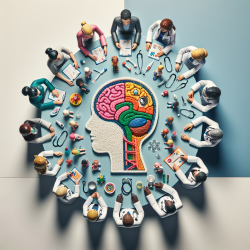As a practitioner dedicated to creating impactful outcomes for children with Autism Spectrum Disorder (ASD), it's crucial to stay informed about the latest research and interventions. One such study, "A randomized, placebo-controlled trial of d-cycloserine for the enhancement of social skills training in autism spectrum disorders," provides valuable insights that could enhance your practice.
The study aimed to assess whether d-cycloserine (DCS), a partial agonist of the NMDA glutamate receptor, could enhance the effects of social skills training in children with ASD. The trial involved 67 children aged 5-11, who were randomized to receive either DCS or a placebo 30 minutes before weekly social skills training sessions over a 10-week period.
Key Findings
- No statistically significant difference in social responsiveness scores between the DCS and placebo groups.
- Overall significant improvement in social responsiveness scores from baseline to end of treatment for the entire group.
- High parental satisfaction across both groups, indicating the perceived value of social skills training.
Although the study did not find a significant drug-related improvement, the overall enhancement in social skills suggests that the social skills training protocol itself is effective. This highlights the importance of well-structured social skills programs in improving social outcomes for children with ASD.
Implications for Practice
As a practitioner, consider the following actionable steps:
- Incorporate Evidence-Based Social Skills Training: Use structured, manualized social skills training programs that include techniques such as role-playing, social stories, and peer modeling.
- Monitor and Measure Outcomes: Utilize standardized measures like the Social Responsiveness Scale (SRS) to track progress and make data-driven decisions.
- Stay Informed: Keep up with ongoing research to identify potential pharmacological adjuncts that could enhance behavioral interventions.
While the study underscores the complexity of treating core social deficits in ASD, it also opens avenues for further research. Future studies could explore different dosages of DCS, longer treatment durations, or alternative outcome measures to capture subtle changes in social behavior.
For practitioners, the takeaway is clear: a combination of robust social skills training and continuous monitoring can lead to significant improvements in social responsiveness in children with ASD. To read the original research paper, please follow this link: A randomized, placebo-controlled trial of d-cycloserine for the enhancement of social skills training in autism spectrum disorders.










